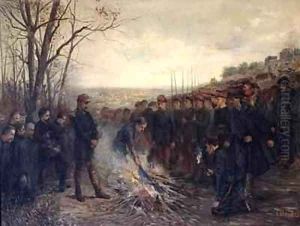Etienne Dujardin-Beaumetz Paintings
Étienne Dujardin-Beaumetz was a French painter, administrator, and politician born on April 28, 1852, in Paris, France. He was known for his career in art as well as his significant role in the administration of arts in France during the late 19th and early 20th centuries. Dujardin-Beaumetz trained as an artist under the guidance of renowned painters such as Carolus-Duran and Jean-Léon Gérôme, two prominent figures in the French academic painting tradition.
In his artistic career, Dujardin-Beaumetz specialized in genre painting, which involves scenes of everyday life. His work often reflected a sense of realism and attention to the social issues of his time, influenced by his academic training and the evolving tastes of the period. Despite his artistic talents, Dujardin-Beaumetz is perhaps better remembered for his contributions to the administration of the arts rather than his paintings.
In the realm of politics and administration, Dujardin-Beaumetz was notably appointed as the Undersecretary of State for Fine Arts in France, a position through which he had significant influence over the direction of French art policy. He was an advocate for the promotion and preservation of French art and played a key role in shaping the state's involvement in artistic affairs.
Over the course of his career, he also took on responsibilities as a curator, overseeing the Luxembourg Museum in Paris, which at the time was dedicated to displaying the works of living artists. His dedication to the arts extended to philanthropy, as he bequeathed his own collection to the state and made contributions to the establishment of museums and the support of artists.
Étienne Dujardin-Beaumetz passed away on April 9, 1913, leaving behind a legacy as a supportive force in the French art world. His efforts in both the creation of art and the stewardship of cultural policy have been recognized as influential in the preservation and promotion of French heritage.
